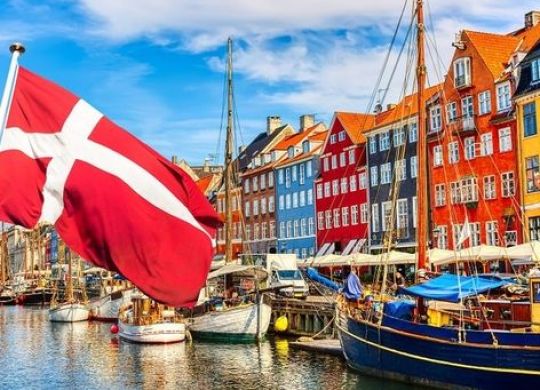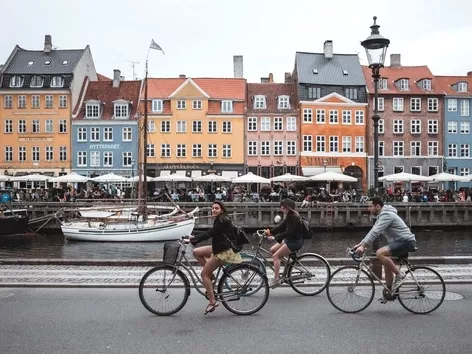Work in Denmark 2025: employment features for foreigners, how to find a job, popular positions, positive list and changes in 2025
Table of contents
- Why is Denmark the best country to move to in 2025?
- Important changes to the employment procedure in Denmark in 2025
- Available types of work visas for foreigners to work in Denmark
- How can a foreigner find a job in Denmark?
- What positions do foreigners work in Denmark in 2025?
- Working conditions in Denmark in 2025
- Average salary in Denmark in 2025
- Taxation for foreign workers in Denmark
- Useful information about employment in Denmark in 2025

Every year, tens of thousands of foreigners apply for jobs in Denmark, as the country offers competitive salaries, a variety of job opportunities and a high standard of living. Find out more about the Danish labor market, the most popular vacancies and the average salary for foreigners in 2025
Denmark is one of the most desirable countries for immigration within Europe for citizens of Nepal, the Philippines, Kenya, Sri Lanka and many other countries of the world. It is sometimes called the “country of happiness”, as the conditions for a comfortable life are created here. If you are a good specialist in your field and want to work, you will be able to quickly adapt to the living conditions in this country. Let's find out what is needed to move to work in Denmark in 2025.
Planning a trip or move abroad? An important part of a successful trip is an insurance policy, as it guarantees high-quality medical care anywhere in the world and can protect you from unnecessary expenses while travelling.
Buy a health insurance policy from trusted agents on the Visit World portal.
Why is Denmark the best country to move to in 2025?
Denmark is a global leader in innovation, sustainability and green energy. Companies are looking for talent to fill key positions, especially in industries such as IT, engineering, healthcare and green technologies. The country is also one of the happiest countries in the world, probably because of its short working week, generous parental leave and free healthcare.
The country is currently experiencing a shortage of skilled workers, which is why the state has made important changes to its migration policy.
Important changes to the employment procedure in Denmark in 2025
Denmark has recently updated its immigration system to attract skilled workers, including:
1. Updated Positive List
The Positive List is a list of professions that are experiencing a shortage of skilled specialists in Denmark. If you have been offered a job on the Positive List, you can apply for a residence and work permit in Denmark under this scheme.
The list is updated twice a year (1 January and 1 July), and currently includes:
- Positive List for Skilled Work
Intended for workers in skilled occupations that are experiencing a labor shortage.
Check the updated list of positive occupations as of 2025 for skilled work at the link.
- Requirements for employers to employ foreigners on the Positive List in Denmark
Employers must fulfill certain obligations for their foreign employees in order to be eligible for a visa for skilled work.
To qualify for a work permit under the Positive List for Skilled Work, your employer must fulfill the apprenticeship training obligation under Læreplads-AUB (Employers' Contribution to Training). Before applying, make sure that your employer meets this requirement.
Read more about the Positive List in Denmark for 2025 in this article.
2. Faster processing times
Denmark has introduced accelerated processing for certain visa categories, helping skilled professionals start their new lives faster.
3. Family-friendly policies
Spouses of work visa holders can now work in Denmark without having to undergo a separate labour market test, making the move much easier for families.
4. New salary standards
From 20 February 2025, new salary standards for the Positive List for skilled work will come into effect. These updates, managed by the Danish Agency for International Recruitment and Integration (SIRI), will affect how work permit applications under this visa scheme are processed.
For jobs without collective agreements: the minimum monthly salary is approximately DKK 74,958.
Available types of work visas for foreigners to work in Denmark
The following visa schemes are also available for foreigners to move to Denmark:
- Positive List Visa – if your profession is on Denmark’s positive list for skilled workers, you are eligible to apply for this work visa without a labor market test.
- Pay Limit Scheme Visa – this is for high-paid professionals with a job offer that pays at least 465,000 Danish kroner (~67,000 USD) per year.
- Fast Track Scheme – designed for certified Danish employers, this visa allows them to quickly hire foreign workers for specialized positions.
- Denmark Start-up Visa – entrepreneurs with innovative ideas can apply for this visa to open their business in Denmark, provided that their offer is approved by the Danish Business Authority.
How can a foreigner find a job in Denmark?
You can find your dream job in Denmark on one of the following websites:
- Workindenmark.dk – the official Danish job portal for international professionals.
- LinkedIn – many Danish employers actively recruit on LinkedIn, so make sure your profile is bright.
- Jobindex.dk – Denmark’s most popular job search website with listings for both English and Danish speakers.
- Recruitment agencies in Denmark.
What positions do foreigners work in Denmark in 2025?
- Seasonal vacancies: picking berries, fruits, vegetables, serving tourists in hotels and restaurants.
- Skilled workers: sailors, architects, engineers, social workers, web developers, designers, maids and medical workers.
Working conditions in Denmark in 2025
The working schedule in Denmark provides for 37 hours per week or 160.2 hours per month, with a standard working day of 8 hours, the lunch break is not included in the paid time.
Regarding vacation, employees are entitled to about 5 weeks of vacation during the year, which can be used discretely. The largest vacation period at one time should not exceed 3 weeks.
Vacation payments can be made in two ways: the employee can be paid full salary during the vacation or an additional 12.5% (14.5% for interns) of the salary amount can be credited to a separate account.
Vacation can be taken from the beginning of May of the following year, which gives employees flexibility in planning their vacation and using their vacation days.
Average salary in Denmark in 2025
The employment system in Denmark is very different from other European countries. Here, state structures minimally interfere in the sphere of medium and small businesses, regulating only the basic conditions of employment. The minimum wage in the country is not fixed and is regulated by collective agreements. Trade unions guarantee its compliance with working conditions, taking into account age, qualifications and specifics of the work.
In Denmark, the average salary is around 5,500 euros, but for qualified specialists who meet certain requirements, this amount can reach 7,000 euros. The highest salaries are for specialists in the fields of insurance, medicine, finance and IT. At the same time, the minimum wage is from 2,700 to 4,500 euros per month for workers in agriculture, construction and the restaurant business.
Applicants for vacancies with a competitive salary (over 5,000 euros) must have English at least level B2, work experience and positive personal qualities such as leadership and communication skills. In addition, it is desirable to have a specialized higher education and basic knowledge of the Danish language.
For those who already have a residence permit in Denmark, the ability to accept a salary offer depends on their own conditions. It is recommended not to accept salary offers below 90 kroner per hour. If you have no work experience or a high level of language skills, you can consider offers from 90 kroner per hour with the right to increase after a year.
If you have received an internship contract in Denmark, your salary is regulated by a union agreement and is 11,444 DKK for the first six months; and then, depending on your age (up to 25 years or older), 13,328 or 15,345 DKK for the next 6 months. After tax, you can expect to receive 9,600 DKK for the first 6 months and 10,600 or 11,700 in the following months.
If you have received an employment contract in the agricultural sector, your salary is fixed depending on the region and varies from 26,100 DKK in Northern Denmark to 29,250 in regions such as Southern Denmark.
Taxation for foreign workers in Denmark
The Danish tax system is complex but well-structured. The total employment tax is 8% of your income. Your salary is then divided into two parts: a bikort (a non-taxable amount) and a residual amount, which is taxed at a rate of 37% to 40%, depending on your municipality.
The bikort is calculated individually for each person according to several factors, such as student status, distance to work, union membership and other factors. This amount can range from DKK 4,000 to DKK 12,000 per month.
You must file a tax return with the tax authorities before you receive your first salary, otherwise 55% of your income will be withheld. The tax return is filed online on the tax authorities’ website.
Every year at the end of March, a recalculation of the taxes paid for the previous year is carried out. Some of the money may be refunded if you overpaid taxes, or you may be asked to return additional funds if you paid too little tax.
Useful information about employment in Denmark in 2025
- All communications with government agencies are carried out through MitID - a personal digital signature. In addition, MitID is also required for interaction with many private companies, for example, to access online banking.
- To receive your salary, you will need a bank account. You can open an account at any bank of your choice. Once you have opened an account, your bank can help you register it as a Nem-Konto (current account), which is necessary to receive payments from the state.
Denmark is one of the best countries in Europe for expats to move to. Moving here will give foreigners good career prospects and life in the happiest country in the EU.
As a reminder! From January 1, 2025, a new positive list of vacancies for qualified specialists came into force in Denmark. The advantage of this list is that it offers a clear migration plan for foreigners who wish to obtain a work permit in the country. We have already told you which specialists will find it easiest to obtain a work visa in Denmark in 2025.
Contact an employment lawyer to understand all the specifics of finding a job in Denmark. The help of a qualified specialist will allow you to get a job in the country quickly and without unnecessary worries.
Products from Visit World for a comfortable trip:
Checklist for obtaining a visa and necessary documents in Denmark;
Legal advice on immigration to Denmark;
Travel insurance for foreigners in Denmark;
Medical insurance all over the world.
We monitor the accuracy and relevance of our information. Therefore, if you see any error or discrepancy, please write to our hotline.
Recommended articles
2 min
Work
Job in Hungary in 2025: who can work in Hungary and the current procedure for obtaining a work visa
Hungary has introduced significant changes to its work visa rules, which will come into effect on January 18, 2025. Find out which foreigners can work in Hungary in 2025 and what the visa procedure is.
29 sty. 2025
More details3 min
Expats
Cost of living in Denmark: expenses for housing rent, food, entertainment and budget for the month
Denmark is included in the list of the happiest countries in the world, and a friendly population, developed transport infrastructure and a high level of health care attract more and more expats here. However, most people know that living in Denmark is expensive. As far as? Find out the prices of accommodation, food, entertainment and more in Denmark in 2024
24 wrz. 2024
More details2 min
Work
Denmark Work Visa: requirements, registration procedure and changes in 2024
Denmark is a European country that boasts one of the highest GDPs in the world, a good environment, a promising economy and a low crime rate. That is why the country is very popular among expats. However, the procedure for obtaining a work visa has its own peculiarities. Find out how an expat can get a job in Denmark and what changes to migration legislation the country's leadership has approved in 2024
27 wrz. 2024
More details2 min
Work
Blue card Sweden in 2025: requirements, registration procedure and current changes
In connection with the acute shortage of specialists, European countries are gradually softening the procedure for obtaining a Blue Card, and Sweden is no exception. Find out how to get a Blue Card in the country and what changes to the document application procedure have come into effect since January 1, 2025
11 sty. 2025
More detailsAll materials and articles are owned by VisitWorld.Today and are protected by international intellectual property regulations. When using materials, approval from VisitWorld.Today is required.
